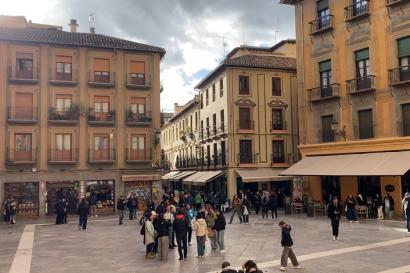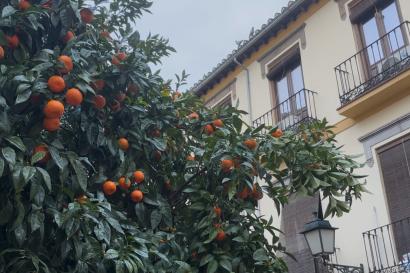I listened to a lot of Simon & Garfunkel in my last few weeks in Granada. As I sat in coffee shops working on final projects and studying for final exams, I played their Greatest Hits over and over again. I know their song “Homeward Bound” now by heart.
Homeward bound /I wish I was /Homeward bound /Home, where my thought’s escaping /Home, where my music’s playing /Home, where my love lies waiting/Silently for me
The song has many appeals. It’s easy to listen to, easy to sing along to, and catchy, but most importantly, it speaks to one of the most universal, and universally sentimentalized, themes: home. It’s especially appealing for someone nearing the end of an extended stay abroad. It’s as the old clichés express: ‘There’s no place like home…home is where the heart is…home sweet home.’ Clichés are clichés for a reason; we repeat them again and again because they distill something that rings true. It’s all there. There’s no need to express them any other way.
And yet…we rarely think of clichés as a good thing. They’re mostly condemned for lacking originality, but in my opinion, what they’re mostly guilty of is over-simplification.
Some of my favorite authors, W.G. Sebald, Gabriel Garcia Marquez and Annie Dillard, write about home. Sebald, who could never reconcile the echoes of the past with the shifting landscape around of him, sees home as the uncanniest of places. And Annie Dillard, fascinated by the natural world, wonders if we can call this inhospitable rock, on which we alight so temporarily, home. In Marquez’s One Hundred Years of Solitude, a bookkeeper travels restlessly between Macondo and Catalonia, not realizing the home he’s missing is a construct of his imagination.
Traveling (and not just reading) has taught me that memory does airbrush, and that time and a sea of separation are a potent combination. It’s taught me that home isn’t something as concrete as the houses we go back to, that it’s something that exists in our heads and hearts.
When we travel, we change. We return home to find that ‘home’ isn’t the neat, little, cozy, comfortable space we knew before, but that it’s more amorphous, more complicated, more something created than given. Home for me is Portland, Oregon and Williamstown, Massachusetts, and my family and friends. But, after three and a half months of living in Granada, there’s also something of home in the sounds rising from the street Rector Lopez Argüeta in the morning, a café con leche in El Asador, and the sight of the Cathedral walking past.
https://www.youtube.com/watch?v=7z9wd9bS1FM

Haley Stewart
Haley Stewart was born and raised in Portland, Oregon, and is currently a Comparative Literature Major at Williams College in Massachusetts. She was lucky enough to be in a Spanish Immersion program from preschool thru high school, an experience which left her a fluent Spanish-speaker, a lover of Latin-American literature and an avid traveler. She's used her Spanish in many ways since, from teaching computer classes in Oaxaca, Mexico, to volunteering at an organization for low-paid farm workers in Oregon, to her classes on Spanish literature and history at Williams. Haley's most recent travel experience, a month and a half long trip to England on a travel fellowship from Williams, hiking alone through the beautiful Lake District in the footsteps of the Romantic poet Wordsworth, has left her even more excited to explore Granada. A lover of Federico Garcia Lorca for many years, Haley looks forward to not only walking, but living, in a city full of such poetry, music and magic.





